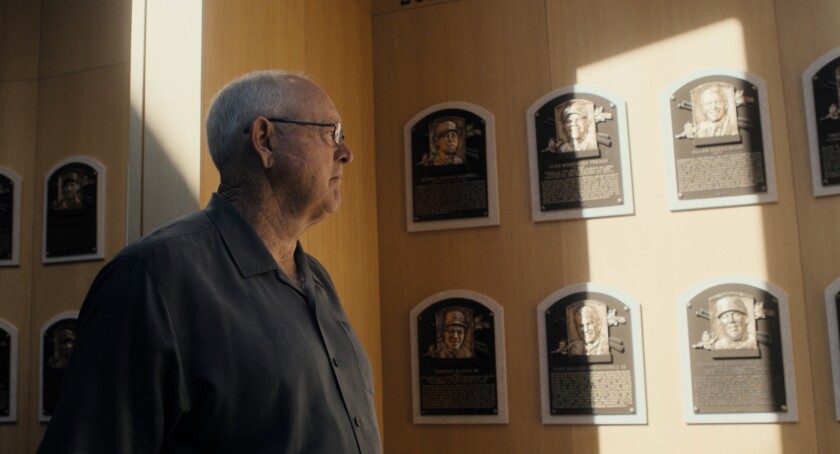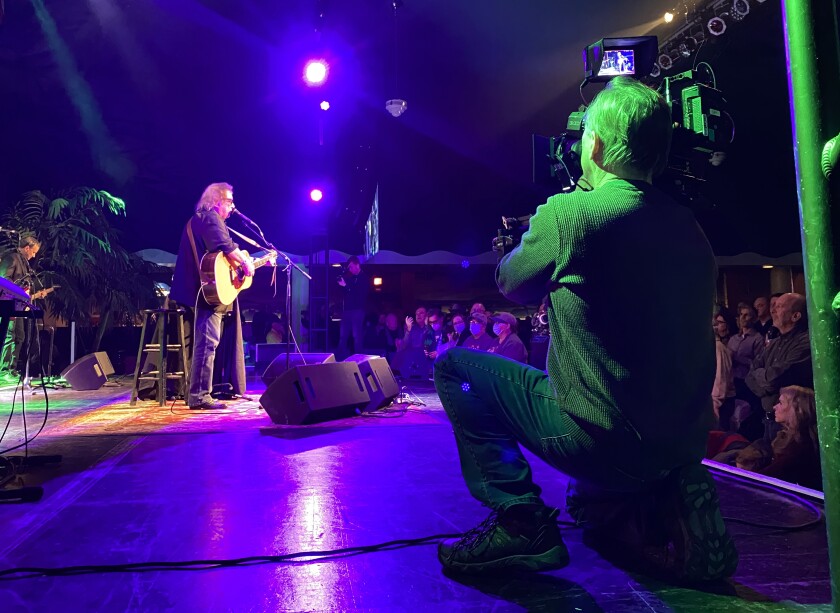‘Aftershock’
In the U.S., a lot of the conversation surrounding pregnancy — whether it has to do with abortion or carrying a child to term — is concerned more with the health of the fetus than the mother. Paula Eiselt and Tonya Lewis Lee’s documentary “Aftershock” argues this has become a huge problem, compounded by an overstressed healthcare system that often rushes patients toward an acceptable outcome rather than attentively taking their needs into account. “Aftershock” suggests the situation is especially dire in the Black community, which has been traditionally underserved by doctors and nurses.
“Aftershock” was partially inspired by the deaths of two women, Shamony Gibson and Amber Rose Isaac, due to complications from childbirth, and is about the ongoing efforts of their surviving relatives to draw attention to what went wrong. Eiselt and Lee cover how these families — and in particular the fathers left behind by their partners’ passing — are still coping with unexpected loss. The film also provides some history lessons on how Black women have been either exploited or ignored by the medical establishment.
The most engrossing parts of “Aftershock” follow one Black couple from Tulsa, Okla. — Felicia and Paul Ellis — as they try to advocate for themselves and their baby-to-be, armed with the knowledge of all the potentially bad outcomes. As they approach the day of delivery, even while heading toward a patient-centered birthing center, their whole experience is nerve-racking in ways it shouldn’t be — thereby making this movie’s point.
‘Aftershock.’ TV-MA. 1 hour, 26 minutes. Available on Hulu
‘This Is GWAR’
Early in Scott Barber’s documentary “This Is GWAR,” the long-running heavy metal band’s former dancer and backup singer Danielle Stampe (a.k.a. Slymenstra Hymen) sums up why the group’s over-the-top, disgusting, wildly theatrical stage shows have such been a cult favorite for more than 30 years. She says that a lot of people initially check out GWAR on a lark, expecting something trashy, but then become entranced by the act’s musicianship, creativity and storytelling. Newcomers quickly realize that this seemingly very silly art-horror-comedy project is, according to Stampe, “a joke with no punchline.”
Barber’s film offers a rare look behind the scenes of the GWAR phenomenon, with the help of frank interviews with most of the surviving members and ex-members (including the ones who left with hard feelings) and copious footage of the band dating back to its origins in the late-1980s Richmond, Va., punk scene. Because GWAR began as a potential science-fiction art-film collaboration between local rocker Dave Brockie and some of his aspiring filmmaker pals — and because so much of the band’s output has had a visual component — Barber had a lot of video documentation to draw from.
“This Is GWAR” is more entertaining in its first hour, when it’s about the band storming into a ’90s pop culture that didn’t know how to handle musicians dressed in oversized costumes and acting like depraved alien warriors. The movie’s second half is more of a bummer, detailing the creative disputes, poorly thought-out career moves, and substance abuse that has taken its toll on GWAR. But this is an oddly inspiring film regardless, celebrating how a crafty DIY aesthetic and a twisted vision can nearly always find a receptive audience.
‘This Is GWAR.’ Not rated. 1 hour, 50 minutes. Available on Shudder
An image from the documentary “The Day the Music Died: The Story of Don McLean’s “American Pie.”
(Meteor 17 / Paramount+)
‘The Day the Music Died: The Story of Don McLean’s “American Pie”’
Don McLean’s eight-minute folk-rock epic “American Pie” has been enchanting some listeners (and, let’s be honest, irritating others) since it first hit the radio in 1971. The documentary “The Day the Music Died” tells the story of the song in a collage-like way, shifting between a look back at McLean’s early career, testimonials from artists who’ve covered and riffed on “American Pie” and vignettes about the song’s initial inspiration: the plane crash that killed Buddy Holly, Ritchie Valens and J.P. “The Big Bopper” Richardson.
Director Mark Moormann (who previously made the superb rock-doc “Tom Dowd & the Language of Music”) has found a lot of different entry points to this subject. Not all are fruitful. The musicians praising “American Pie” as an all-time great make this picture at times feel like a puff piece; and the segments about Holly and Valens are too short and too one-dimensional to do these legends justice. But “The Day the Music Died” does really connect whenever McLean starts breaking down where “American Pie” came from — including debunking some of the myths about the cryptic lyrics and describing the long process of writing and recording. Somehow, the more McLean explains the song, the more wondrous it seems.
‘The Day the Music Died: The Story of Don McLean’s “American Pie.”’ Not rated. 1 hour, 34 minutes. Available on Paramount+
‘The Wheel’
Indie drama “The Wheel” suffers from some of the troubles common to small-scale films about relationships in crisis. The characters reveal themselves almost entirely through blunt conversations rather than through action. The moody soundtrack is ubiquitous, carrying too much of the emotional weight. And screenwriter Trent Atkinson and director Steve Pink build to a big gut-spilling confrontation that comes off forced. Still, for all its formulaic faults, “The Wheel” is unusually astute about the ways some couples avoid the hard truths about each other because they’re afraid of ripping their whole lives apart.
There are two couples in this picture: a bickering pair (played by Amber Midthunder and Taylor Gray) on a last-ditch mountain retreat to stave off divorce; and their Airbnb hosts (played by Bethany Anne Lind and Nelson Lee), who are days away from getting married before their guests’ problematic romance starts to expose cracks in their own. The cast here is game, and the filmmakers do challenge them, putting them in situations where their characters can either keep lying to themselves to preserve a mildly miserable status quo or make a big change that could leave them feeling even worse. The path to those decisions is too straight and too simple, but to Atkinson and Pink’s credit, the endpoint is never obvious.
‘The Wheel.’ Not rated. 1 hour, 22 minutes. Available on VOD

Hall of Famer Nolan Ryan in the documentary “Facing Nolan.”
(Utopia)
‘Facing Nolan’
The title of Bradley Jackson’s documentary, “Facing Nolan,” refers to a few moments in the film when some of the best Major League Baseball players of all time talk about what it was like to step into the batter’s box against Nolan Ryan, a Hall of Famer who holds the all-time MLB records for strikeouts and no-hitters (and both by a lot). That kind of nuts-and-bolts baseball talk is sparser than expected in “Facing Nolan,” which for the most part is a fairly straightforward biodoc, tracing Ryan’s life and career from his boyhood in rural Texas to his stints with four big-league teams.
But while it may not be formally groundbreaking, this doc is still a treat for die-hard baseball fans, who should enjoy seeing footage from games ranging from the ’60s to the ’90s. It’s also a sweet portrait of the pitcher’s family, led by his wife, Ruth, who worked to make sure that one of the most famous athletes in America could lead a comfortable, more low-key home life. At times “Facing Nolan” feels more like a salute to Ruth than to Nolan. But given how long she’s had to be a ballplayer’s wife, the tribute is overdue.
‘Facing Nolan.’ Not rated. 1 hour, 41 minutes. Available on VOD
‘Dickie V’
ESPN’s early success was due in large part to the fledgling cable sports network’s embrace of college basketball as a way to fill hours of airtime in the 1980s. And the popularity of those broadcasts had a lot to do with one of ESPN’s first analysts: Dick Vitale, a former coach with an upbeat attitude and an infectious enthusiasm for the game. Vitale has been away from the microphone a lot lately, battling cancer — something covered in slice-of-life scenes throughout Nick Nanton’s documentary “Dickie V.” The bulk of Nanton’s film is about this unlikely TV star’s inspirational story, from his early success as a high school and college coach through the disastrous NBA stint that set him on his ultimate path to become a cable pioneer. Throughout, Vitale has won over colleagues, fans and the college basketball establishment — and will likely reach this movie’s viewers too — with his commitment to spreading a message of teamwork, positivity and self-worth. He’s an easy guy to root for, just as he roots for everybody else.
‘Dickie V.’ Not rated. 1 hour, 20 minutes. Available on ESPN+
Also streaming
“The Cinema of Mark Rappaport” collects more than 30 features and shorts by the great American documentarian and experimental filmmaker, including well-known classics like “Rock Hudson’s Home Movies” and “The Silver Screen: Color Me Lavender,” plus rarely seen video essays and narrative dramas. Rappaport has spent 50-plus years putting images and ideas from older films into fresh contexts, playfully and thoughtfully encouraging viewers to see and hear our common cinematic language in a new way. Available on Kino Now
Available now on DVD and Blu-ray
“God Told Me to” is one of exploitation auteur Larry Cohen’s best films, turning the story of an NYPD detective (Tony LoBianco) and an elusive killer into a wild tale of cults, aliens and deep family secrets. The new 4K UHD and Blu-ray edition includes multiple interviews and two commentary tracks, which all try to dig beneath the surface of this strange and surprising B-movie masterpiece from 1976. Blue Underground

